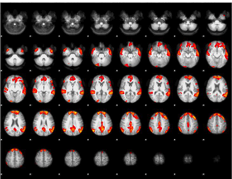THEMES OF LAB RESEARCH
Metacognition and Related Constructs: Do you really know about...what you know? Knowing about knowing, known as metacognition, is an aspect of self-awareness that refers to the ability to make in-the-moment judgments about one's own performance while engaged in a cognitive task, as well as the ability to alter behavior accordingly. We are interested in how these and related processes (such as error-detection/awareness, performance monitoring) are affected after moderate to severe traumatic brain injury (TBI), and in turn how metacognitive accuracy after injury influences other domains of functioning and/or return to every day living. We are also interested in understanding the neural mechanisms underlying metacognitive functioning after TBI.
"Messy" TBI (Intersection of TBI and mental/behavioral health in at risk populations): TBI never happens in a vacuum, and individuals coping with injury must often deal with other life complications. Thus, the context in which the injury occurs as well as other psychological factors that individuals are simultaneously coping with can greatly effect how: 1) the brain responds to injury, 2) the individual functions after injury, and 3) the trajectory of recovery. Our lab partners with several community agencies to conduct research that is aimed at better understanding the additive and interactive effects of TBI in individuals who may coping with other life circumstances (e.g., domestic violence, substance use).
Heterogeneity and Within-Sample Variance: Much of TBI research focuses on group differences; that is, how is the injured brain different than the healthy brain? While identifying such differences is helpful, it is also important to consider subgroup or individual differences within samples. Investigating the variability within samples provides a more comprehensive understanding of recovery trajectories after injury, and has significant implications for development of more individualized or personalized approaches to rehabilitation. Thus, we are interested in researching how individuals may be affected differently by injury, and what factors may lead to different levels of functioning, trajectories of recovery, and response to treatment.
Neuroplasticity: The dynamic nature of the brain is, in our humble opinion, one aspect that makes it such a fascinating and remarkable organ! Research has shown that there are structural and functional changes that occur in the brain after TBI. We are interested in better understanding how these changes occur, how these changes affect functioning in different domains, as well as what factors may influence these changes. Our research projects investigate change at various time intervals, from changes that occur over a number of trials in one study paradigm, to more long term changes across years through the help of our collaborators.
METHODS AND APPROACHES TO RESEARCH

Our lab uses a mix of the following tools/methodologies to conduct our research:
-structural magnetic resonance imagining (e.g., volumetric analyses, diffusion tensor imaging)
-functional magnetic resonance imaging (fMRI)
-neuropsychological assessment
-traditional cognitive/experimental paradigms
-through collaborations, there are also opportunities to use: electroencephalography (EEG)/event related potentials (ERP), eye-tracking, & salivary bioscience techniques